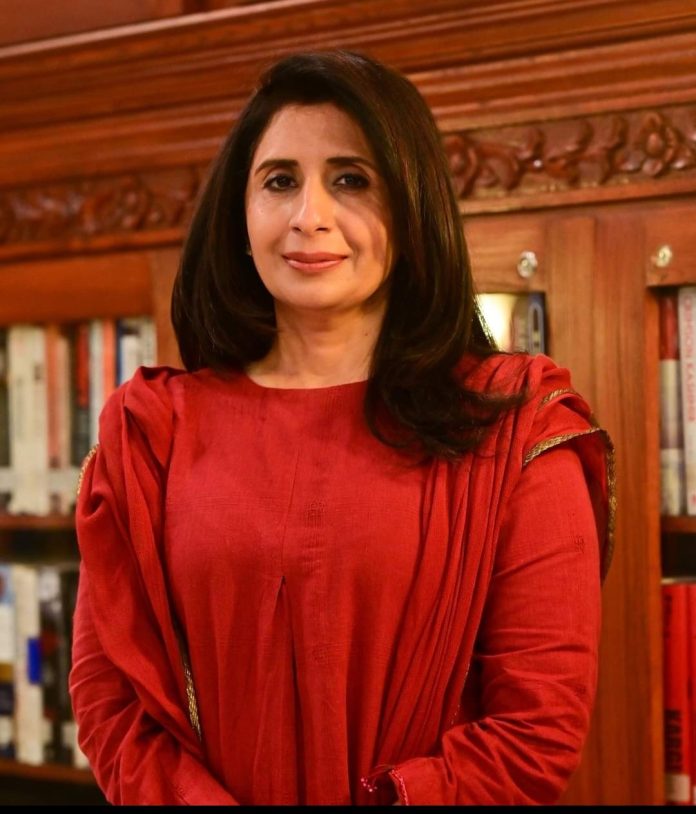Foreign Minister Jalil Abbas Jilani is currently in China at the special invitation of Foreign Minister Wang Yi for participation in the Third Trans-Himalaya Forum for International Cooperation being held in Tibet Autonomous Region from 4-5 October 2023. Initiated in 2018, the Trans-Himalaya Forum serves as a platform for regional countries to strengthen practical cooperation in connectivity, environmental preservation, ecological conservation, and the bolstering of cultural ties. This year’s theme is “Ecological Civilization and Environmental Protection.”
This morning, the Foreign Minister delivered the keynote address at the Opening Ceremony of the Trans-Himalaya Forum. In his address, he emphasized the importance of regional cooperation in addressing environmental degradation, climate change, and ecological diversity loss. He underscored Pakistan’s commitment to ecological balance and urged policy coordination and experience-sharing between countries in the region. He also reaffirmed support for regional cooperation for clean and sustainable development.
The Foreign Minister has held a bilateral meeting with the Chinese Foreign Minister Wang Yi on the sidelines of the Forum. Emphasizing the positive trajectory of bilateral ties, they discussed various aspects of the Pakistan-China friendship and exchanged views on regional and global matters. The two Foreign Ministers reaffirmed their commitment to the China-Pakistan Economic Corridor (CPEC) and pledged to enhance high-level exchanges and strategic communication for continued cooperation.
In Tibet, the Foreign Minister has also met with the Deputy Prime Minister of Mongolia, Sainbuyan Amarsaikha. The Foreign Minister emphasized our commitment to strengthen Pakistan-Mongolia ties which are rooted in shared cultural and historical linkages. The two Foreign Ministers reaffirmed their commitment to high-level exchanges and robust dialogue. The talks included plans to enhance bilateral trade and investment and mutually beneficial cooperation in diverse areas.
The 12th Round of Bilateral Political Consultations (BPC) between Pakistan and Norway was held in Islamabad yesterday. The Pakistan delegation was led by Ambassador Muhammad Saleem, Additional Foreign Secretary (Europe) while the Norwegian delegation was led by Mr. Vebjorn Dysvik, Director General, Department for Regional Affairs, Norwegian Ministry of Foreign Affairs.
The two sides reviewed the entire spectrum of bilateral relations and exchanged views on regional and multilateral issues of mutual interest. They reaffirmed their commitment to further strengthen bilateral cooperation in climate change, maritime and shipping industry, renewable energy, trade and investment, higher education and science and technology. The Pakistan side appreciated the valuable contributions by the Norwegian companies in Pakistan’s economy and invited Norway to explore further investment prospects through SIFC.
Pakistan and Norway cooperate closely on bilateral and multilateral issues. Pakistani diaspora in Norway is contributing positively to Norway’s economy and society and serves as a bridge between the two countries. The BPC serves as a useful platform to review progress in existing areas of cooperation and to identify new avenues of cooperation. The 13th round of the BPC will be held in Oslo.
Pakistan and GCC have concluded the negotiations on the Pakistan-GCC Free Trade Agreement. Pakistan-GCC FTA is the first such agreement concluded by GCC with any country since 2009. We look forward to the early signing, ratification, and implementation of the Agreement, which we believe will contribute to growth and mutual prosperity and mark a new chapter in economic relations between Pakistan and GCC.
At the ongoing sessions of the UN General Assembly and the UN Human Rights Council, Pakistan continues to pursue an agenda of peace, dialogue and mutual understanding between diverse religions and civilizations. In its capacity as the coordinator of Geneva-based OIC Group, Pakistan co-organized with the OIC Observer Mission in Geneva an event titled “Mapping the efficacy of normative framework on religious discrimination, intolerance and hatred”. The event aimed to raise awareness on the growing phenomenon of religious discrimination, intolerance and hatred and the need for strengthening normative framework for its redressal from a human rights perspective. This event will supplement our efforts to combat Islamophobia and all forms of discrimination, intolerance and hatred against persons based on their religious beliefs.
The Indian forces continue to commit serious human rights violations in Indian Illegally Occupied Jammu and Kashmir (IIOJK). During the month of September, the Indian troops killed 13 Kashmiris in extra-judicial killings and arrested 157 civilians and activists. Those arrested were mostly booked under the draconian laws promulgated by the occupation authorities in IIOJK — Public Safety Act (PSA) and Unlawful Activities (Prevention) Act (UAPA). Such oppressive measures and human rights violations must end and the Kashmiri leaders be set free so that the Kashmiri people can freely exercise their right to self-determination.

















